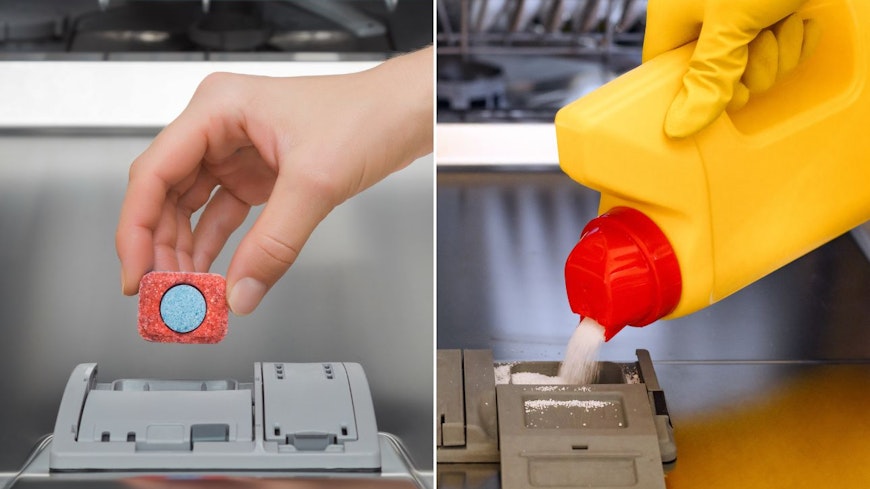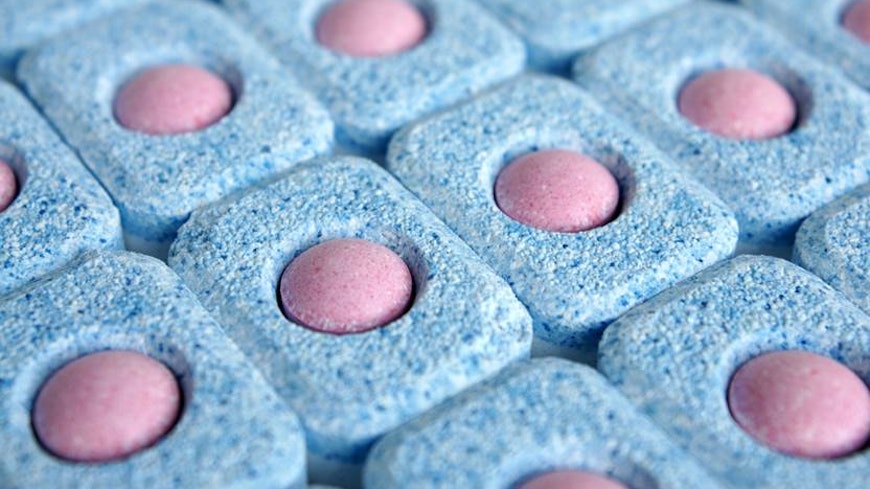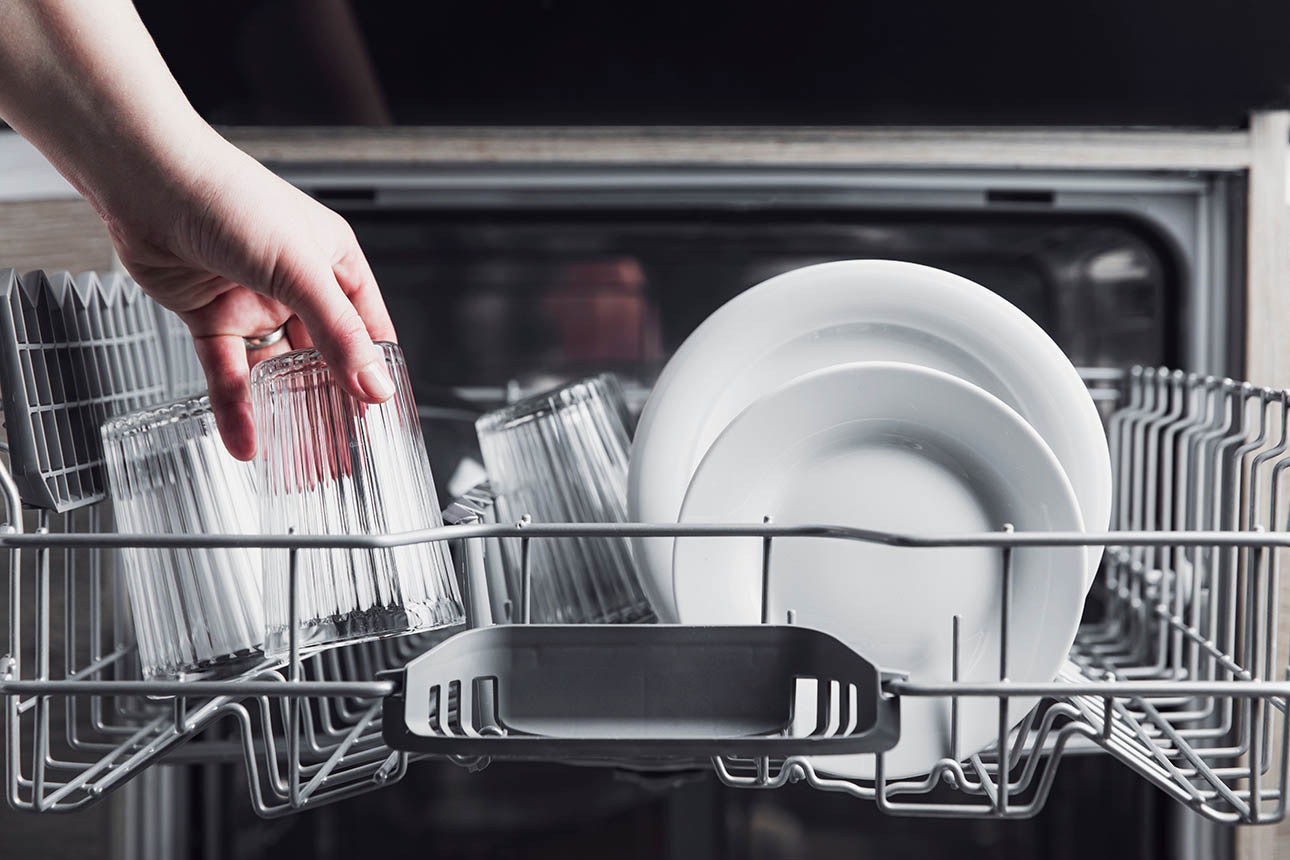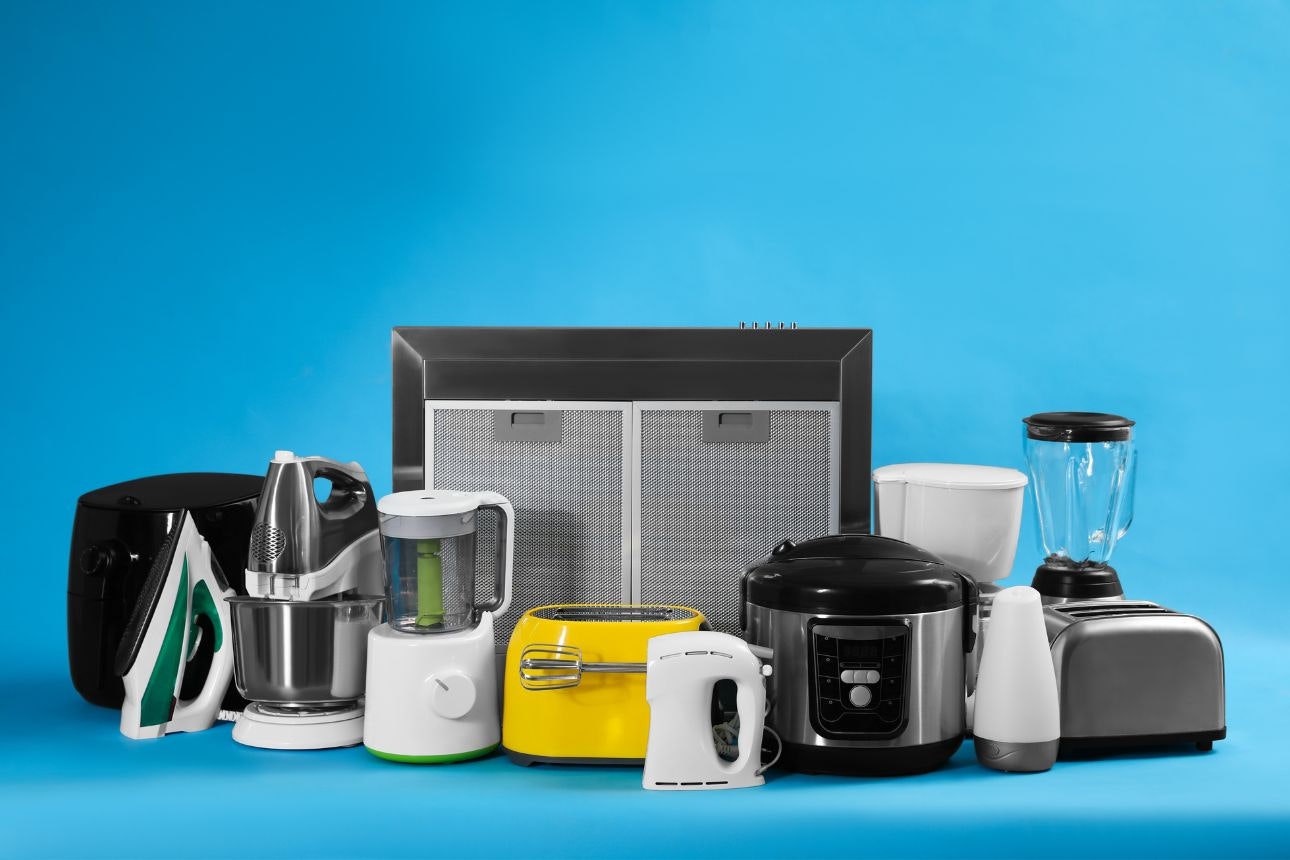How to choose the best detergent for sparkling dishes.
Tablet or powder?
There are two main types of dishwasher detergents – tablets and powders. Some manufacturers also make capsules or pods, which are a liquid variation of the tablet.
Our testing has consistently found tablets and capsules perform better than powders.

Tablets
Pros
Clean well
Convenient pre-dosed
Often contain rinse aid
Cons
Expensive per wash
May not be usable in some dishwashers
Powders
Pros
Cheap per wash
Control over dosage
Cons
Don’t clean well
Need to add rinse separately
Can be messy adding to dispenser
Over and under dosing is easy
Things to consider
Rinse aid
If your dishwasher’s rinse aid light has flashed and you’ve wondered – do I really need to top it up? – the answer is yes.
Rinse aid is a surfactant that speeds up drying by reducing water surface tension. Lower water surface tension means water easily slides off items into the bottom of the dishwasher where it’s pumped away. This also means water droplets won’t settle on items and, if there’s no water droplets, there won’t be nasty water stains from minerals in the water when the water evaporates.
Rinse aid is so beneficial to the washing process that most tablet and capsule detergents come with it already included. But powders won’t include rinse aid, as it needs to be released at a certain point of the wash, which isn’t possible with powder.
Powder detergent – make sure to keep your rinse aid dispenser topped up!
Tablet or capsule detergents – it’s optional to add extra rinse aid.
Can you use vinegar instead of rinse aid?
Vinegar is often touted as an alternative to rinse aid, but we don’t recommend using it. Vinegar is a good natural cleaner that can dissolve the minerals in water and reduce the appearance of water spots, but the negatives outweigh the positives.
When used in a dishwasher, vinegar doesn’t reduce the surface tension of water or speed up drying. Even worse, it may be damaging your dishwasher as vinegar can contribute to breakdown of rubber seals and gaskets. One off use won’t be that harmful, but regular use, such as using it as a rinse aid substitute, is a bad idea.
So why do people suggest using vinegar as an alternative to rinse aid? It’s possible that people think it works well as vinegar can help dissolve the minerals in water meaning it’s good at reducing the appearance of water spots, but rinse aid does more than make the dishes look good, and it won’t harm your dishwasher.
Septic tanks
Some products claim to be safe for septic tanks, but we’ve found that they often don’t back up this claim, for example by quoting a testing standard. As septic tank designs can differ quite a bit, and using the wrong product can have costly consequences, you should always consult your septic tank’s manual or manufacturer before using a new dishwasher detergent.
Dishwasher cleaners
Dishwashers do a tough job and, while most look nice and clean after a wash, grease and limescale can build up in hard-to-see parts, such as the filters, spray arms, pipes, water pump and drains. While dishwasher cleaning products can help keep your dishwasher sparkling an occasional hot wash when it’s empty can work just as well and won’t cost anything but your time. See our tips on cleaning and maintaining your dishwasher.
Should you be loyal to a detergent?
When you run out of dishwasher detergent, it’s easy to pick up the same product during your weekly shop. But there’s no guarantee that buying the same product means you get the same performance.
Formulation does change
We test dishwasher detergents every year, and part of the process for choosing products to test is contacting manufacturers to see if what is currently on the shelves is going to change formulation before we can publish the results (a few months after buying). We often get replies from manufacturers and distributors that there are changes to the formulation planned or it’s just been changed. Changes in formulation can affect performance, for better or worse. So don’t assume the detergent you buy is always the same or will perform the same.
Performance within a brand can be variable
We’ve been testing dishwasher detergents for a long time and some years we see a great deal of variation between products of the same brand. For example, this year there were eight Finish tablets in our test. The best performing and recommended product was the Ultimate Plus All in 1 Lemon Sparkle, which scored 84% and earnt our recommended tick. But our test also included the Finish Classic Everyday Clean tablet, which scored just 62% and didn’t get our recommended tick. That’s a massive difference in performance for the same type of product (tablets) made by the same brand.
Parallel-imported products
It’s not uncommon to see parallel-imported detergents being sold in major retailers, such as chemists, department and hardware stores. These products are often imported by retailers directly, not the local New Zealand distributor for that brand, and will not necessarily perform the same. For example, Finish is sold in many countries around the world, and there’s no guarantee that a product made for the Polish market and parallel imported is comparable in performance to one made for New Zealand. So, if you currently use a product that’s not parallel imported, don’t expect the same performance if you substitute for one that is from the same brand.
For more on parallel-imported products and how to identify them, see the ‘Parallel imports’ section below.
If it’s time to restock your dishwasher detergent, then check out our test results to find the best performers and try a few different products until you find the right one for you.
Bulk buying
Buying detergent in larger packs often reduces the cost per wash. However, as they’re likely to be stored for longer, this increases the chances of moisture in the air causing tablets to stick together and powder to clump.
To help avoid this, if the manufacturer’s packaging can’t be sealed completely, keep your detergent in an airtight container. Keep the original packaging, as this can help with identification if someone swallows it or the product is recalled.
Phosphates are bad
Phosphates promote algal growth in waterways, which can choke the waterways’ natural vegetation. The good news is that phosphates are no longer necessary in dishwasher detergents. Dishwasher detergents now often rely on enzymes and surfactants instead. As phosphates have stopped being used, a detergent claiming to be “phosphate free” risks misleading consumers, as it is touting a benefit that’s no longer relevant.
Parallel imports
Parallel-imported detergents are often genuine (in other words, non-counterfeit) products brought into the country by a store or distributor without the manufacturer’s permission. For example, Reckitt Benckiser New Zealand owns the Finish brand and supplies most stores, such as supermarkets, with formulas it considers relevant for the New Zealand market. However, some companies import Finish products from other regions in the world.
Parallel-imported products can often be identified because they incorporate multiple languages other than English on their packaging, and place their safety and ingredients information (such as the importer name and National Poisons Centre information) on a sticker instead of printing it on the packaging.
Often a parallel-imported product will have an almost identical name to the one provided by the local distributor, but are likely to have different formulations meaning they’ll perform differently.
Keeping children safe
Always keep your dishwasher detergent well out of reach of children and keep the packaging so you can quickly identify the product. Medical advice is available 24/7 from the National Poisons Centre (0800 POISON). If someone ingests a detergent, call an ambulance.
To make sure your kids stay safe:
Always store dishwasher detergents well out of the reach of children
or in a locked cupboard– especially dishwasher tablets, as a child
could easily confuse them with sweets.Only put detergent in the dishwasher when you're ready to start a
wash. Make sure any residue is removed from the dispenser afterwards
and close the door firmly. Burn injuries can occur when a child
swallows detergent left in the dispenser.Child-resistant packaging reduces the risk of children coming into
contact with dishwasher detergent, but no container is 100% "child
proof".
First aid: what to do

Dishwasher detergents often contain corrosive alkaline salts, which can cause chemical burns.
The National Poisons Centre advises that if a dishwasher powder or tablet is:
Swallowed: immediately rinse the mouth and remove any remaining powder. If the person is having difficulty breathing, keep them calm and help them into the recovery position or lie them on their side. Call an ambulance.
On skin: immediately flush the exposed area with lots of water and seek medical advice. Don’t leave the powder on the skin, even for a few minutes: it is corrosive and causes burns.
In eyes: immediately flush the eye with room-temperature water from a jug or low-pressure tap for at least 15 minutes and seek medical advice.
Medical advice is available 24 hours a day, 7 days a week from the National Poisons Centre, freephone 0800 POISON (0800 764 766). If you suspect ingestion, or the patient is unconscious or having difficulty breathing, call 111 immediately.
Ingredients you should be wary of
Several common detergent ingredients are classed as toxic or irritating by the Environmental Protection Agency (EPA).
Sodium carbonate: toxic if ingested or inhaled and an irritant to skin and eyes
Sodium silicate: toxic if ingested and corrosive to the skin and eyes
Sodium percarbonate: irritating to the eyes
Alcohol ethoxylates: most are toxic if swallowed and can irritate the skin and eyes; some can also damage your eyes
Enzymes (e.g. amylase, protease and subtilisin): most enzymes in dishwasher detergents aren’t dangerous if ingested, but they can affect the respiratory system if inhaled, and can irritate the skin and eyes
Notably, the dissolvable wrappers that tablets come in are made from water soluble polyvinyl alcohol (PVA or PVOH), a non-toxic substance.



